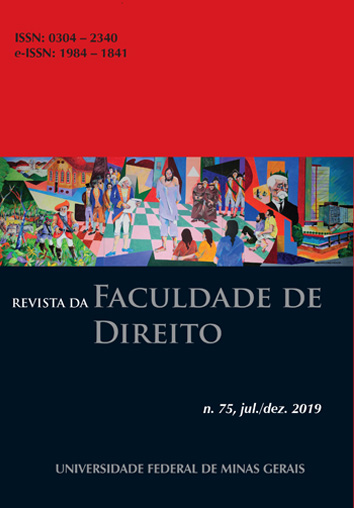COMPLEMENTAR AS LEIS EXISTENTES CONTRA ILEGAIS MONOPÓLIOS E RESTRIÇÕES À ATIVIDADE ECONÔMICA: A LEI CLAYTON DE 1914 - DOI: 10.12818/P.0304-2340.2019v75p155
Resumo
A Lei Clayton de 1914 introduziu mudanças relevantes no direito antitrust dos Estados Unidos da América. De acordo com essa importância, este artigo investiga os aspectos jurídicos que influenciaram a versão original da Lei Clayton, considerando as questões que determinaram seu conteúdo. O estudo se concentra nos dispositivos de direito material editados e sua importância para fundamentar a proteção legal da concorrência.
Referências
ARNOLD, P. Conservative Crisis and the Rule of Law: Attitudes of Bar and Bench, 1887–1895. New York, Cornell University Press, 1960.
BEACH, A. Treatise on the Law of Monopolies and Industrial Trusts: As Administered in England and in the United States of America. St. Luis, Central Law Journal Company, 1898.
BRANDEIS, L. Other People's Money, and How the Bankers Use It. New York, F.A. Stokes Company, 1914.
CANFIELD, G. Is a Large Corporation an Illegal Combination or Monopoly under the Sherman Anti-Trust Act? Columbia Law Review, Vol. 9, No. 2 (Feb. 1909), pp. 95-115.
DINIZ, D. Contra Ilegais Monopólios e Restrições à Atividade Econômica: A Lei Sherman de 1890. Rev. Fac. Direito UFMG, Belo Horizonte, n. 73, pp. 173-204, jul./dez. 2018.
FOX, E. Modernization of Antitrust: A New Equilibrium. 66 Cornell L. Rev. 1140 (1981).
GIANOZZI, E. L’Emploi des Standards en Droit Romain. Fundamina (Pretoria). Vol. 22, N. 2, 2016, pp 205-231.
HOVENKAMP, H. Enterprise and American Law: 1836-1937. London: Harvard University Press, 1991.
HOVENKAMP, H. Whatever Did Happen to the Antitrust Movement? Notre Dame Law Review, Vol. 93, Pg. 583, 2018.
JONES, E. The Trust Problem in the United States. New York, MacMillan Company, 1921.
KALES, A. The Sherman Act. 31 Harv. L. Rev. 412 (1917-1918).
KEASBEY, E. New Jersey and the Great Corporations. Harvard Law Review, Vol. 13, No. 3 (Nov., 1899), pp. 198-212.
KOLASKY, W. The Election of 1912: A Pivotal Moment in Antitrust History, 25 Antitrust 82 (2011).
LAMOREAUX, N. The Great Merger Movement in American Business, 1895-1904. Cambridge, CUP, 1985.
LETWIN, W. Law and Economic Policy in America: The Evolution of the Sherman Antitrust Act. New York, Random House, 1954.
LINK, A. Woodrow Wilson and the Progressive Era-1910-1917. New York. Harpers and Brothers, 1954.
LIPPMANN, W. Drift and Mastery: An Attempt to Diagnose the Current Unrest. New York, Mitchell Kennerly, 1914.
MAHONEY, J. Backsliding Convert: Woodrow Wilson and the "Seven Sisters". American Quarterly, Vol. 18, No. 1 (Spring, 1966), pp. 71-80.
MCCORMICK, R. The Discovery That Business Corrupts Politics: A Reappraisal of the Origins of Progressivism. The American Historical Review, Vol. 86, No. 2 (Apr., 1981), pp. 247-274.
MCCRAW, T. Prophets of Regulation: Charles Francis Adams, Louis D. Brandeis, James M. Landis, Alfred E. Kahn. Cambridge: Harvard University Press, 1984.
MCCURDY, C. The Knight Sugar Decision of 1895 and the Modernization of American Corporation Law, 1869-1903.The Business History Review, Vol. 53, No. 3, Legal and Business History (Autumn, 1979), pp. 304-342
MELTZER, B. Labor Unions, Collective Bargaining, and the Antitrust Laws. University of Chicago Law Review: Vol. 32: Iss. 4, Article 3 (1965).
MORAWETZ, V. Should the Anti-Trust Act Be Amended? Harvard Law Review, Vol. 22, No. 7 (May, 1909), pp. 492-500.
PERITZ, R. Competition Policy in America, 1888–1892: History, Rhetoric, Law. New York: Oxford University Press, 1996.
PETERS, W. Agricultural Cooperatives and the Antitrust Laws, 43 Neb. L. Rev. 73 (1964).
POPE, H. The Legal Aspect of Monopoly. Harvard Law Review, Vol. 20, No. 3 (Jan., 1907), pp. 167-191.
SCHLAG, P. Rules and Standards, 33 UCLA L. Rev. 379 (1985).
SCHWARTZ, B. The Law in America. New York: McGraw-Hill Book Co., 1974.
SEAGER, H. The New Anti-Trust Acts. Political Science Quarterly, Vol. 30, No. 3 (Sep., 1915), pp. 448-462.
STEFFENS, L. The Shame of the Cities. New York: McClure, Phillips, 1904.
STEFFENS, L. New Jersey: A Traitor State - Part II.—how she sold out the United States. McClure’s Magazine, N.Y.,1905.
STUCKE, M. Does the Rule of Reason Violate the Rule of Law? UC Davis Law Review, Vol. 42, No. 5, 2009.
UPDYKE, F. New Jersey Corporation Laws. The American Political Science Review, Vol. 7, No. 4 (Nov., 1913), pp. 650-652.
WEINSTEIN, J. The Corporate Ideal in the Liberal State: 1900-1918. Boston: Beacon Press, 1968.
WRÓBLEWSKI, J. Legal Standards: Theoretical Problems of Legislation and Enforcement of Law. Aix-Marseille, Revue de La Recherche Juridique - Droit Prospectif, 1988-4, p. 843-869.




















